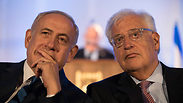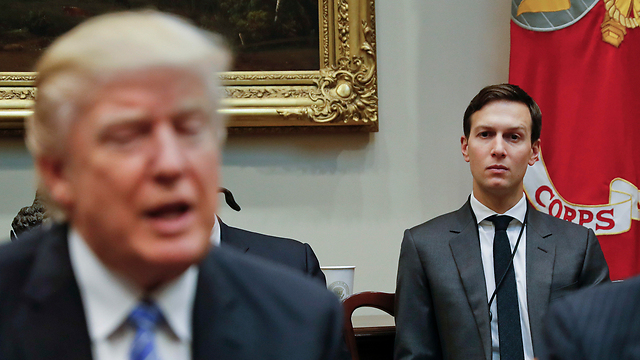

Trump’s Jewish advisors butting heads over Israel
Analysis: Since David Friedman left for Israel, senior officials in Washington say, Jared Kushner has become the most dominant person in the president’s inner circle. While his basic commitment to Israel is unquestionable, Kushner is in favor of a tougher stance towards Jerusalem and reducing the pressure on the Palestinians and the Arab world.
Trump has three senior Jewish advisors on the Israeli issue: David Friedman, who was appointed US ambassador to Israel, special envoy Jason Greenblatt, and Kushner. After seeing Kushner’s activity in Saudi Arabia and in the Persian Gulf, administration officials reached the conclusion that he is the “weak link” as far as Israel is concerned. These officials aren’t questioning Kushner’s basic commitment to Israel, but they are saying that he believes Jerusalem could make more generous concessions, while the American pressure on the Arab world and on the Palestinians should be reduced at this stage.
The senior officials add that since leaving for Israel, Friedman is less capable of balancing Kushner in the president’s inner circle in Washington, although his status is still very strong.

Meanwhile, Ambassador Friedman has been called to Washington for consultations in a bid to finally form the American policy in the region. Greenblatt is scheduled to arrive in the region this week to continue the talks between the parties. At some point later on, he is expected to present a document of principles which will include the opening terms for negotiations.
Officials who have spoken to Greenblatt are under the impression that the document will be quite general and will omit any political obstacles as far as Prime Minister Benjamin Netanyahu is concerned. In other words, it won’t mention the words 1967 lines, refugees, Jerusalem, Jewish state, settlement construction freeze, etc.
What will be included in the document? Time-limited negotiations for the establishment of two states, an end to the incitement, security, demilitarization of the future Palestinian state, as well as partial normalization measures on the Arab states’ part while the talks go on. The last clause is an innovation. In the past, the Arabs’ condition for any normalization was Israeli-Palestinian peace. The Americans realized that in order to restore the Israeli public’s trust in the process, they should present some initial signs of normalization, such as allowing Israeli planes to fly over Arab countries.
Israeli officials, meanwhile, expect Trump to officially announce the renewed negotiations in a three-way meeting with Netanyahu and Palestinian President Mahmoud Abbas at the White House around August or September. Senior government ministers say that Netanyahu is working in full coordination with Trump, and that the timing of the announcement may have a political aspect as well. It may correspond, for example, with the results of the Labor Party elections. Clearly, Netanyahu would rather see Isaac Herzog reelected as the party’s leader, especially if he decides to renew his efforts to get the Zionist Union to join his coalition before the peace negotiations are restarted.
“It has to do with the police investigations as well,” says a senior government minister. “If Netanyahu senses, for example, a police recommendation to prosecute him in October, don’t be surprised if a major diplomatic boom captures the headlines in September. He will also put an exaggerated emphasis on the diplomatic pressure he is subject to. The Americans won’t impose a document on us which we were not involved in formulating. There’s no coercion here. There’s no pressure. It’s Bibi, and he’s the one calling for the pressure.”















